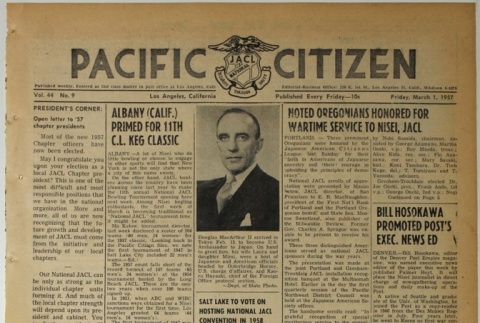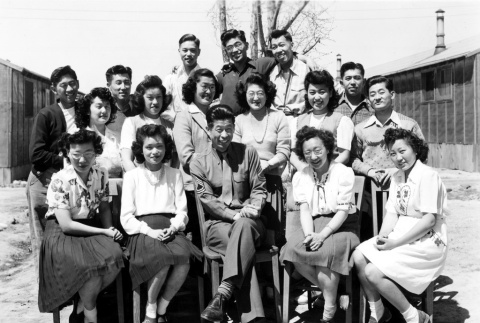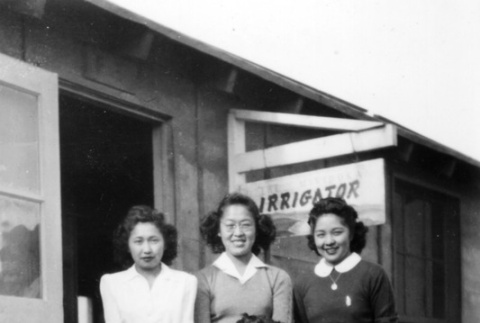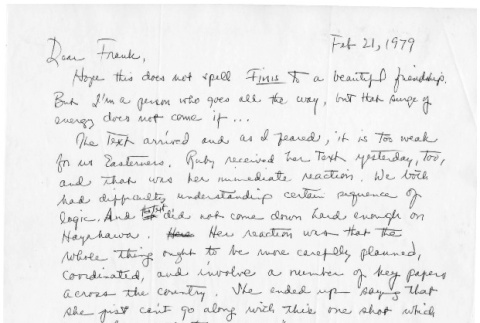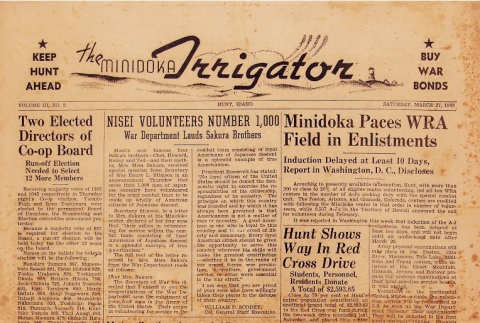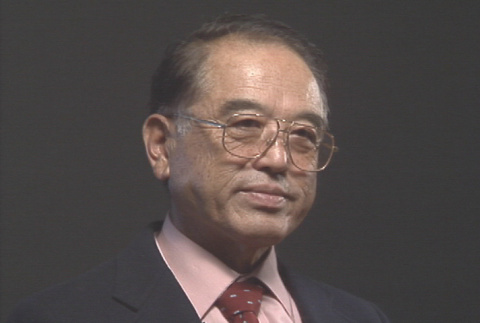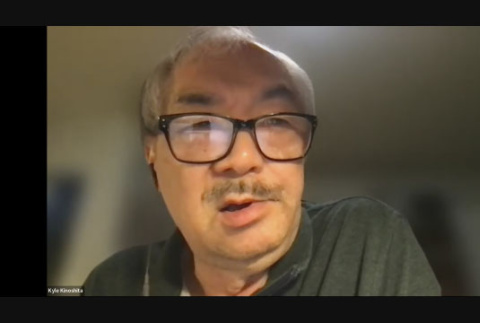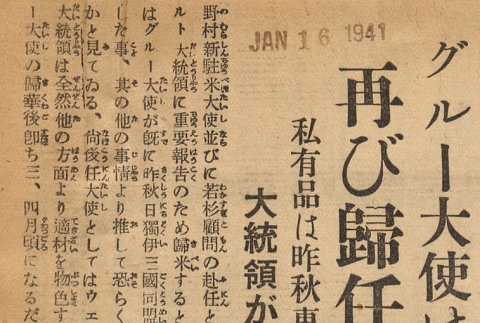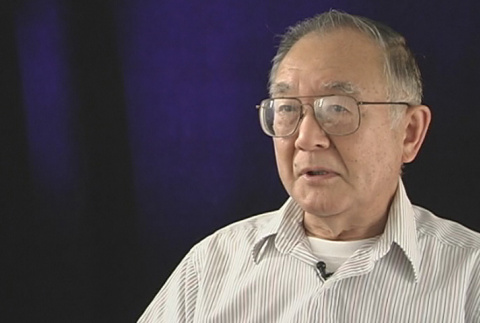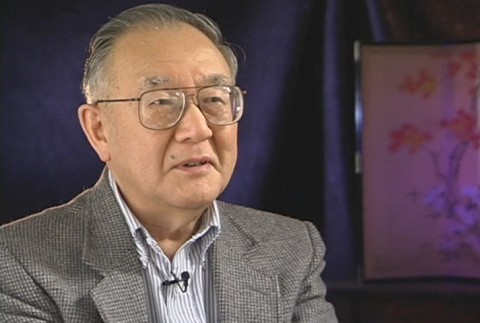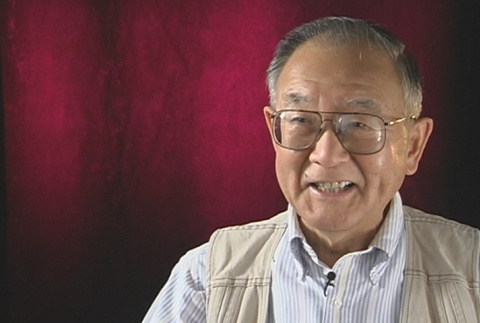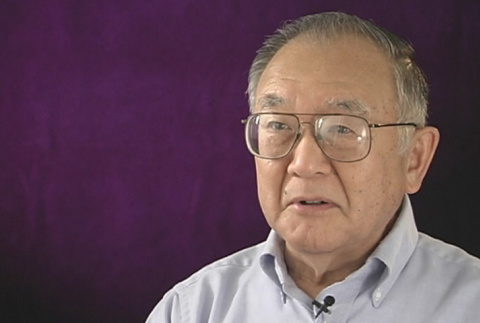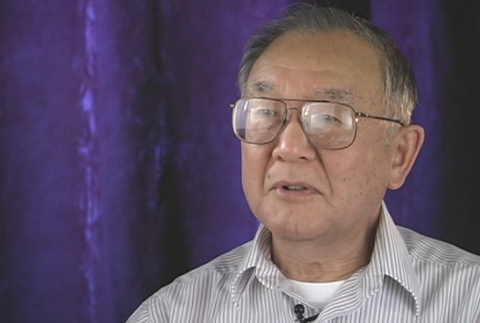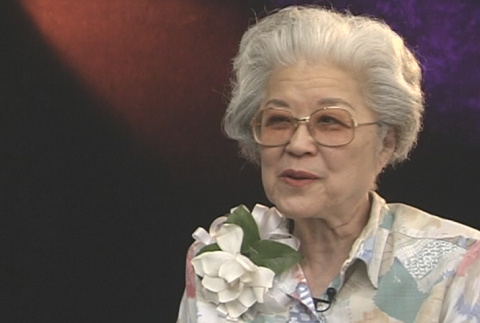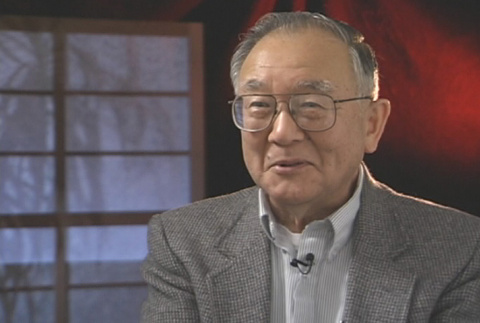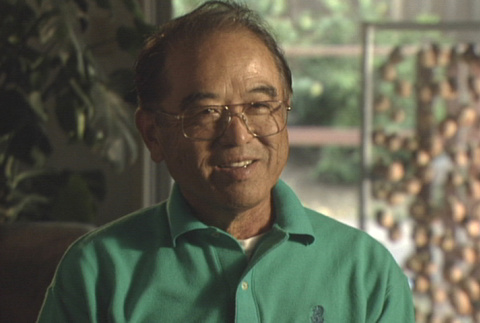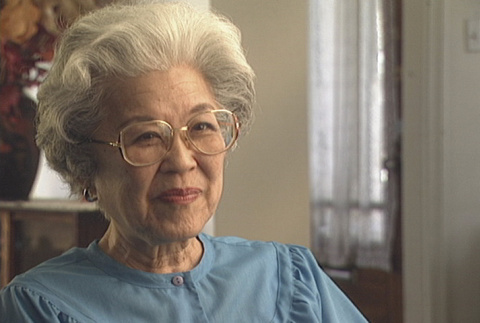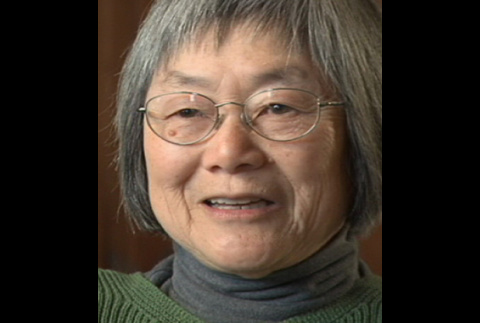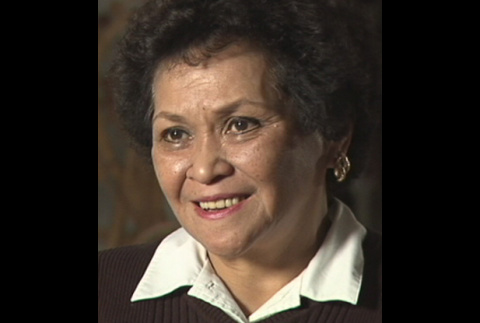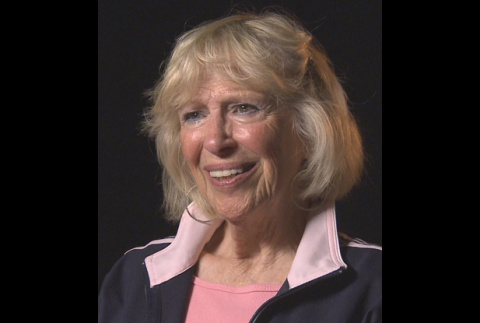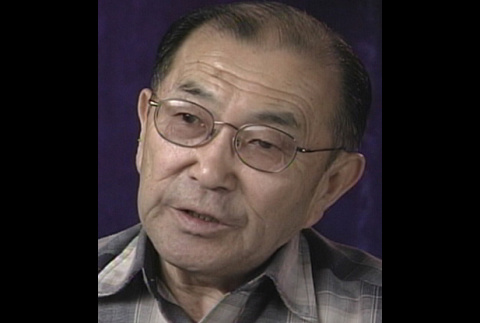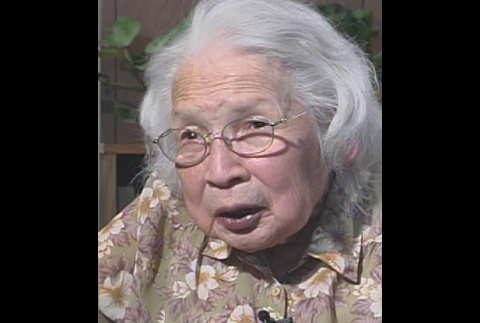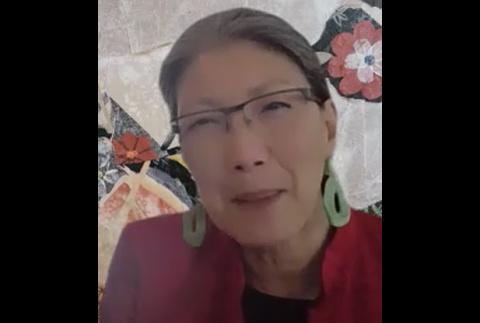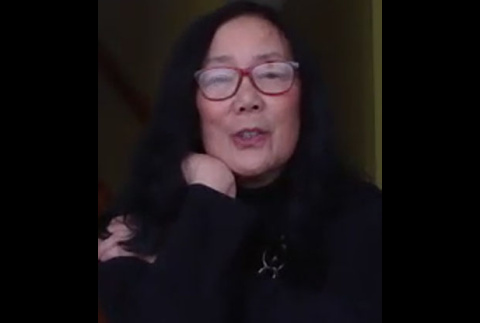3148 items
3148 items
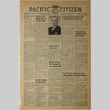
doc
Pacific Citizen, Vol. 44, No. 9 (March 1, 1957) (ddr-pc-29-9)
Selected article titles: "Noted Oregonians Honored for Wartime Service to Nisei, JACL" (p. 1); Bill Hosokawa Promoted Post's Exec. News Ed" (p. 1); Shonien 'red carp,' JACL 'pinwheel' on L.A. museum exhibit" (p. 1); No. Calif. Japanese Americans launch $5,000 campaign for Immigration Museum" (p. 1); "Issei, Nisei, Sansei...Sensei" (p. 2); "Seek central camp in Orange …
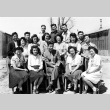
img
Nisei soldier and the staff of the Minidoka Irrigator (ddr-densho-10-1)
T-Sergeant Ben Kuroki (center front), a famous Nisei war hero, poses with the staff of the Minidoka Irrigator, the Minidoka concentration camp newspaper. Front (left to right): Mitsu Yasuda, Cherry Tanaka, Ben Kuroki, Kimi Tambara, and Kerry Soejima. Middle: Mitsuko Miyoshi, unidentified, Sachi Yasui, Miye Takatsuka, Masako Tsujikawa, and Watson Asaba. Back: Johnny Okamoto, Peter Ohtaki, …
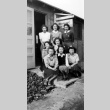
img
The staff of the Minidoka Irrigator (ddr-densho-10-4)
People of various ages worked on the Minidoka Irrigator, the newspaper of the Minidoka concentration camp. Issei were in charge of writing the Japanese section of the newspaper, for those who did not understand English. The Nisei concentrated on stories in English. Front (left to right): Kimi Tambara, Cherry Tanaka, and Mitsu Yasuda. Middle: Miyuki Inouye …
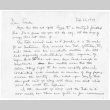
doc
Letter from Michi Weglyn to Frank Chin, February 21, 1979 and February 22, 1979 (ddr-csujad-24-60)
Two letters from Michi Weglyn to Frank Chin. In the first letter, dated February 21, 1979, Weglyn criticizes a piece of writing Chin sent to Weglyn and others for their feedback. Weglyn refers to the piece as Chin's "'Dear Senator Sam' letter." One of her primary criticisms is that Weglyn feels Chin is not hard enough …
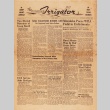
doc
Minidoka Irrigator Vol. III No. 5 (March 27, 1943) (ddr-densho-119-33)
Selected article titles: "Two Elected Directors of Co-op Board. Run-off Election Needed to Selected 12 More Members" (p. 1), "Civil Service Jobs Re-Open. WRA Plan for Use Of Nisei In Gov't. Jobs Meets Approval" (p. 1), "Naturalization Assured Alien Volunteers In War Powers Act" (p. 1), "New Barracks for WRA Staff Members To Overlook Canal" (p. …
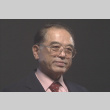
vh
Mits Koshiyama Interview (ddr-densho-122-10)
Nisei male. Born August 7, 1924, in Mountain View, California. Grew up in the Santa Clara Valley, California, working on his family's leased strawberry farm. In June of 1942, he was involuntarily "evacuated" to Santa Anita Assembly Center, California, then to Heart Mountain concentration camp, Wyoming. Graduated from high school in camp and at the age …
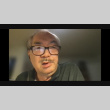
vh
In Memory of Cherry Kinoshita Interview (ddr-sjacl-2-34)
In this interview, Ana Tanaka and Joy Misako St. Germain interviewed Dr. Kyle Kinoshita to discuss Kinoshita's mother's, the late Cherry Kinoshita and Kyle Kinoshita's contributions to the JACL and the JA community. "Keep Your Eyes on the Prize," could well have been Cherry Kinoshita's mantra. She was the linchpin in the Seattle JACL and National …
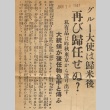
doc
Newspaper clipping regarding Joseph Grew (ddr-njpa-1-473)
Caption on front [translation]: "Ambassador Grew Won't Come Back After Returning to the US? Personal Possessions Already Sent From Tokyo Last Fall. The President Believed to Be Already Looking for Successor. It has been reported that US ambassador to Japan Grew will return to the US for an important report to President Roosevelt at about the …
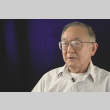
vh
Henry Miyatake Interview IV (ddr-densho-1000-56)
Nisei male. Born April 28, 1929, in Seattle, Washington. Incarcerated at Puyallup Assembly Center and Minidoka concentration camp, Idaho. Had some key childhood experiences with discrimination that made him a self-described, "independent thinker," and later, an influential figure in the Japanese American community. While a teenager in camp, he wrote and defended an essay criticizing the …
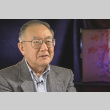
vh
Henry Miyatake Interview I (ddr-densho-1000-53)
Nisei male. Born April 28, 1929, in Seattle, Washington. Incarcerated at Puyallup Assembly Center and Minidoka concentration camp, Idaho. Had some key childhood experiences with discrimination that made him a self-described, "independent thinker," and later, an influential figure in the Japanese American community. While a teenager in camp, he wrote and defended an essay criticizing the …
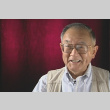
vh
Henry Miyatake Interview V (ddr-densho-1000-57)
Nisei male. Born April 28, 1929, in Seattle, Washington. Incarcerated at Puyallup Assembly Center and Minidoka concentration camp, Idaho. Had some key childhood experiences with discrimination that made him a self-described, "independent thinker," and later, an influential figure in the Japanese American community. While a teenager in camp, he wrote and defended an essay criticizing the …
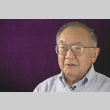
vh
Henry Miyatake Interview III (ddr-densho-1000-55)
Nisei male. Born April 28, 1929, in Seattle, Washington. Incarcerated at Puyallup Assembly Center and Minidoka concentration camp, Idaho. Had some key childhood experiences with discrimination that made him a self-described, "independent thinker," and later, an influential figure in the Japanese American community. While a teenager in camp, he wrote and defended an essay criticizing the …
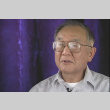
vh
Henry Miyatake Interview VI (ddr-densho-1000-58)
Nisei male. Born April 28, 1929, in Seattle, Washington. Incarcerated at Puyallup Assembly Center and Minidoka concentration camp, Idaho. Had some key childhood experiences with discrimination that made him a self-described, "independent thinker," and later, an influential figure in the Japanese American community. While a teenager in camp, he wrote and defended an essay criticizing the …
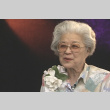
vh
Aiko Herzig-Yoshinaga Interview I (ddr-densho-1000-16)
Nisei female. Born August 5, 1924, in Sacramento, California. Grew up in Sacramento and Los Angeles. During World War II, removed to the Manzanar concentration camp, California, and transferred to the Jerome concentration camp, Arkansas. Washington representative and researcher for National Council for Japanese American Redress (NCJAR) and primary archival researcher for the Commission on Wartime …
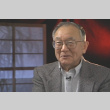
vh
Henry Miyatake Interview II (ddr-densho-1000-54)
Nisei male. Born April 28, 1929, in Seattle, Washington. Incarcerated at Puyallup Assembly Center and Minidoka concentration camp, Idaho. Had some key childhood experiences with discrimination that made him a self-described, "independent thinker," and later, an influential figure in the Japanese American community. While a teenager in camp, he wrote and defended an essay criticizing the …
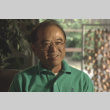
vh
Mits Koshiyama Interview (ddr-densho-1002-6)
Nisei male. Born August 7, 1924, in Mountain View, California. Grew up in the Santa Clara Valley, California, working on his family's leased strawberry farm. In June of 1942, he was involuntarily "evacuated" to Santa Anita Assembly Center, California, then to Heart Mountain concentration camp, Wyoming. Graduated from high school in camp and at the age …
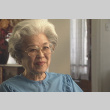
vh
Aiko Herzig Interview (ddr-densho-1002-8)
Nisei female. Born August 5, 1924, in Sacramento, California. Grew up in Sacramento and Los Angeles. During World War II, removed to the Manzanar concentration camp, California, and transferred to the Jerome concentration camp, Arkansas. Washington representative and researcher for National Council for Japanese American Redress (NCJAR) and primary archival researcher for Commission on Wartime Relocation …

Narrator Hisa Matsudaira
Nisei female. Grew up on Bainbridge Island, Washington, where family ran a farm. During World War II, removed to the Manzanar concentration camp, California, eventually transferring to the Minidoka concentration camp, Idaho. After the war, returned to Bainbridge Island.

Narrator Doreen Rapada
Female of First Squamish Nation and Filipino descent. Born August 3, 1943, on Bainbridge Island, Washington. Grew up on Bainbridge Island, where parents worked as strawberry farmers and were prominent members of the Filipino American community on the island.

Narrator Margie Nahmias Angel
White female. Born June 1, 1924, in Seattle, Washington. Grew up in the Central District of Seattle where mother ran a boarding house. Discusses her reaction when her Japanese American peers had to leave Seattle during World War II.

Narrator John Kanda
Nisei male. Born July 10, 1925, in Seattle, Washington. Grew up in the Thomas-Auburn area of Washington. Following Executive Order 9066, family was removed to the Pinedale Assembly Center, then to Tule Lake concentration camp in California. Later transferred to Minidoka concentration camp, Idaho. Volunteered as a replacement for the 100th/442nd Regimental Combat Team and trained …

Narrator Yasashi Ichikawa
Issei female. Born 1907 in Shimonoseki, Japan. Attended school in Japan, and was encouraged by father to study English. Married a Buddhist minister and immigrated to the United States. Lived in Fresno, California, then returned to Japan for two years. Moved to Seattle, Washington, where husband was a minister at the Seattle Buddhist Temple. During World …

Narrator Kip Tokuda
In this session, Ana Tanaka led a panel of Kip Tokuda's friends (Janice Deguchi, Akemi Matsumoto, Rep. Sharon Tomiko Santos, Barbara Lui, and Bill Tashima) in a remembrance of Tokuda. Tokuda was an iconic leader in the Japanese American community who as a Washington State Legislator, Seattle JACL President, and local organizer advocated and established programs …

Narrator Rep. Sharon Tomiko Santos
In this session, Ana Tanaka led a panel of Kip Tokuda's friends (Janice Deguchi, Akemi Matsumoto, Rep. Sharon Tomiko Santos, Barbara Lui, and Bill Tashima) in a remembrance of Tokuda. Tokuda was an iconic leader in the Japanese American community who as a Washington State Legislator, Seattle JACL President, and local organizer advocated and established programs …

Narrator Barbara Lui
In this session, Ana Tanaka led a panel of Kip Tokuda's friends (Janice Deguchi, Akemi Matsumoto, Rep. Sharon Tomiko Santos, Barbara Lui, and Bill Tashima) in a remembrance of Tokuda. Tokuda was an iconic leader in the Japanese American community who as a Washington State Legislator, Seattle JACL President, and local organizer advocated and established programs …
